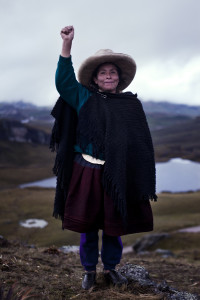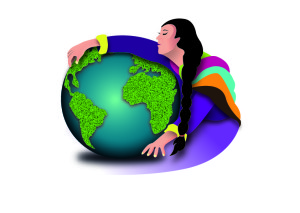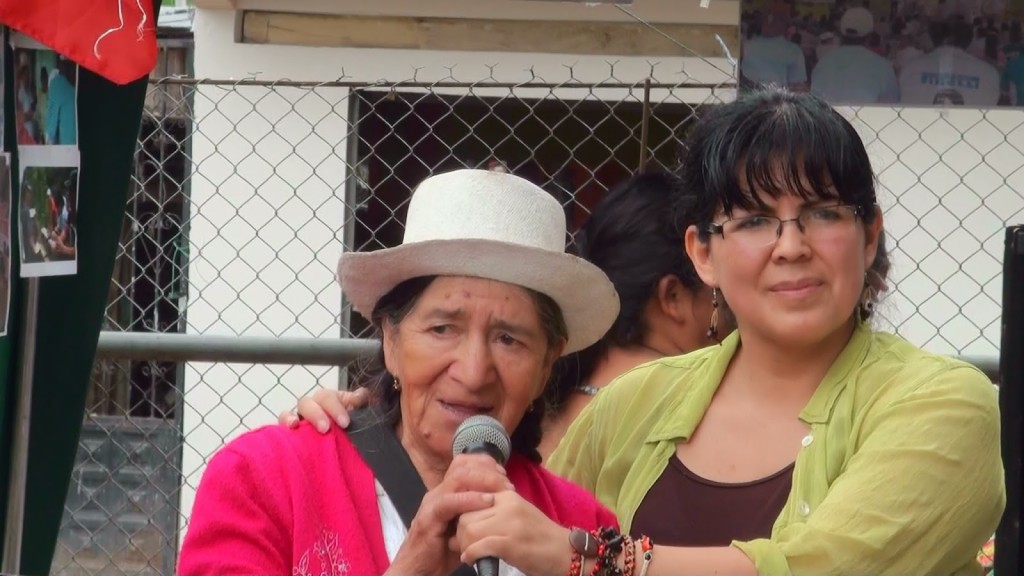by Camilla Capasso, Latin American Mining Monitoring Programme

Máxima Acuña, by Alexander Luna for Guardianes del Agua
Máxima lives in Peru, in a house by the Blue Lagoon of Celendin in the Andean region of Cajamarca. Like most campesinos of her community, Máxima and her family are subsistence farmers and herders. The mountainous area in which they live is not only their home but also the main source of livelihood. In 1997, when deposits of gold and copper were found beneath two of the lakes in the area, Máxima’s entire life came under threat. As Minera Yanacocha began its operations, police officers confiscated all of Maxima’s possessions, threatened her family and beat her on a number of occasions.
Máxima’s situation is neither unique nor limited to Peru. The violation of human rights and the impact that unregulated extraction of natural resources has on the lives of rural and indigenous people has become a matter of serious concern in several parts of the world. In this scenario, however, the specific impact that resource extraction policies and practices have on women are still largely unexamined.
The rush for mineral resources, as well as the introduction and expansion of large-scale industries can change the gendered dynamics within a society, either resulting in new opportunities for development, or emerging tensions from changing routines. The nature of mining activities and the environment of most mining companies, for instance, makes men more likely than women to enjoy new opportunities and benefit from the sudden inflow of economic revenue. This, along with forced displacement, can result in deep social and cultural changes as in the fragmentation and polarisation of communities, that tend to have a more negative impact on women.
The increase in gender based violence is one example; the large influx of men that is brought by extractive projects into the community can create security issues for women by exacerbating an already discriminatory context, or by inciting the traffic of sex workers.
Although policy-makers have recognised the need for new forms of legal intervention, a gender-neutral approach to human rights is still largely in use. In the case of forced displacement, for instance, the gender aspects of rehabilitation remain mostly unexamined due to the assumption that men and women experience these processes in the same way.
The protection for women’s rights in mine-affected areas is embedded into much broader and thorny discussion on business and human rights. In an interconnected and globalised world, where for example a British company can operate in West Africa or a Canadian enterprise can develop in Latin America through local subsidiaries, the question of human rights obligation and territoriality remains a grey area. This is particularly challenging for victims attempting to access remedy and demanding accountability for business-related violations, as there are very few legal frameworks to date that would transcend jurisdiction.
The 2011 UN Guiding Principles on Business and Human Rights (UNGPs) is an attempt to bridge this gap, in order to prevent and address the risk of adverse impacts on human rights linked to business activity. Establishing three pillars, the UNGPs outline both the States’ and the corporation’s role in integrating/promoting human rights in the context of business operations: the State’s duty to protect human rights, the corporate responsibility to respect human rights, and access to remedy for victims of business-related abuses.
“No one can deny that the UNGPs provide the most authoritative reference point on business and human rights” – affirms International human rights lawyer Andrea Schemberg – “They are proving influential in at least three ways: influencing high level policy norms and legislation in the international and domestic contexts; changing business practices; and changing the expectations of stakeholders (states, NGOs, investors, consumers, and businesses with respect to their business partners)”.
Despite providing an important benchmark for addressing business-related violations, many challenges remain for the implementation of the UNGPs. Firstly as a non-binding treaty, victims of violations have little to hold on to in order to protect their rights. This power imbalance is strongly felt by individuals like Máxima, who, as women, are disproportionately affected by resource extraction policies and practices worldwide, and who face a number of additional barriers stemming from their gender, class and ethnic background.
Drawing on the UNGPs, on the 26th of October 2015, the Latin American Mining Monitoring Programme (LAMMP) will present an international conference entitled “Beyond Good Business: Advocating for Women’s Rights in the Context of Natural Resources Extraction and the UN Guiding Principles on Business and Human Rights” (info and registration here, hashtag #beyondGB). The event aims at exploring the big-picture and the day-to-day challenges faced by women impacted by the extraction of natural resources worldwide. While creating a web of support, the event will also raise awareness on the issue, promote women’s rights and empowerment, and seek to offer concrete solutions to be fully implemented into the UNGPs. Human rights activists, academics, lawyers and representatives of mining corporations will join the discussion through a series of panels that will both expose the issues affecting women impacted by the extraction of natural resources, and explore strategies to prevent and mitigate the abuses.
 “I hope the conference will enable all participants to have a fruitful sharing of their experiences and efforts to protect their lands/communities from extractive and destructive projects” – Filipino human rights defender Jane Lingbawan Yap-Eo told LAMMP -“Hopefully this event will result in a shared agreement between the parts that could be addressed to like-minded institutions, concerned governments, and the United Nations bodies”.
“I hope the conference will enable all participants to have a fruitful sharing of their experiences and efforts to protect their lands/communities from extractive and destructive projects” – Filipino human rights defender Jane Lingbawan Yap-Eo told LAMMP -“Hopefully this event will result in a shared agreement between the parts that could be addressed to like-minded institutions, concerned governments, and the United Nations bodies”.
For more info on the event and to register, visit the Beyond Good Business website
For more info on the Latin American Mining Monitoring Programme, visit LAMMP.org and @InfoLAMMP
Camilla Capasso tweets at: @CamillaCapasso



Recent Comments